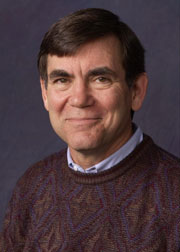21 avril 2016: Dr Richard Houghten
Jeudi 21 avril 2016, 12h30
CMU - C150
«Historically, combinatorial libraries have been seen to promise far more than they ever deliver, but the work of Richard Houghten and his colleagues has been an exception to that depressing rule for two decades or more. Now, recent advances have taken things to a spectacular new level in terms of the potential for new discoveries and of easy access to the methods for members of the biomedical research community of all backgrounds.»
Robin OFFORD
Professeur honoraire, Faculté de médecine UNIGE
Hosts:
Robin OFFORD & Oliver HARTLEY
Département de pathologie et immunologie, Faculté de médecine UNIGE
__________________________________________________
Richard HOUGHTEN
President and CEO
Torrey Pines Institute for Molecular Studies
Florida, USA

«An Alternative Route to the Discovery of Radically New Drugs»
In our search for novel pain modulating compounds we have identified highly active individual compounds from a library of over 17 million tetra-peptides by screening, not with receptor-based assays as is usual, but phenotypically, directly in mice and rats. For example, several individual compounds identified had antinociceptive activity comparable to or better than morphine. One of these was found to have no interaction with the three known opiate receptors and lacks all the well known deleterious behavioral effects of the classic opiates. No specific receptor target has yet been identified.
Given the size of the library, and the fact that we used living rodents for screening rather than receptor assays, our success would seem counter-intuitive. This presentation will explain how the organization of the library nonetheless permitted screening with less than 500 samples, and how individual high potency compounds can make their presence felt, even when in a mixture apparently swamped by thousands of less active ones.
The library used for this work is one of more than 110 highly varied combinatorial libraries that we have produced; most are based on scaffolds other than peptides. The collection is presented on up to three 96-well plates, which our academic collaborators can use with their own preferred assays to select the most promising scaffold(s) for detailed screening. They then move to identifying individual hit compounds and accumulating structure-activity data. Applications are not restricted to analgesic discovery, and this talk will discuss striking successes by collaborating institutions in Florida in the identification of candidate antibiotics and anti-cancer drugs, as well as hits against a wide range of other screening targets.
Our Institute, a not-for-profit entity, would be happy to supply its libraries outside Florida: the only qualification is to have a reproducible assay (in-vitro or in-vivo) with reasonable signal to noise characteristics.
Biography
Dr. Houghten is the Founder, President and CEO of the Torrey Pines Institute for Molecular Studies. The Institute was founded in 1988 in California, and in 2007 it opened a second site in Florida. Dr. Houghten received his doctorate from the University of California, Berkeley in 1975. After occupying a number of positions, including that of Assistant Professor of Medicine at Mount Sinai School of Medicine, he joined The Scripps Research Institute in 1981. In addition to the not-for-profit Torrey Pines Institute for Molecular Studies, he founded three commercial businesses, including one that became a publicly-traded biotechnology company. In collaboration with his long-time associates and colleagues at Torrey Pines Institute for Molecular Studies, he developed the concept of ‘positional scanning’, an approach to combinatorial chemistry invaluable for the rapid identification of individual compounds from millions to billions of others; the use of existing combinatorial libraries to generate entirely new diversities of compounds (libraries from libraries); the cross-referencing of library screening results with gene data bases in order to fine-tune the direction towards which further testing moves for a given disease target (biometrical analysis); and novel volatilizable solid supports. Many of these technologies have resulted in "leads", which are today undergoing further testing and analysis in pharmaceutical companies. Dr. Houghten has won numerous prizes and awards. He is a board member of BioFlorida, and a Past President of the American Peptide Society.
